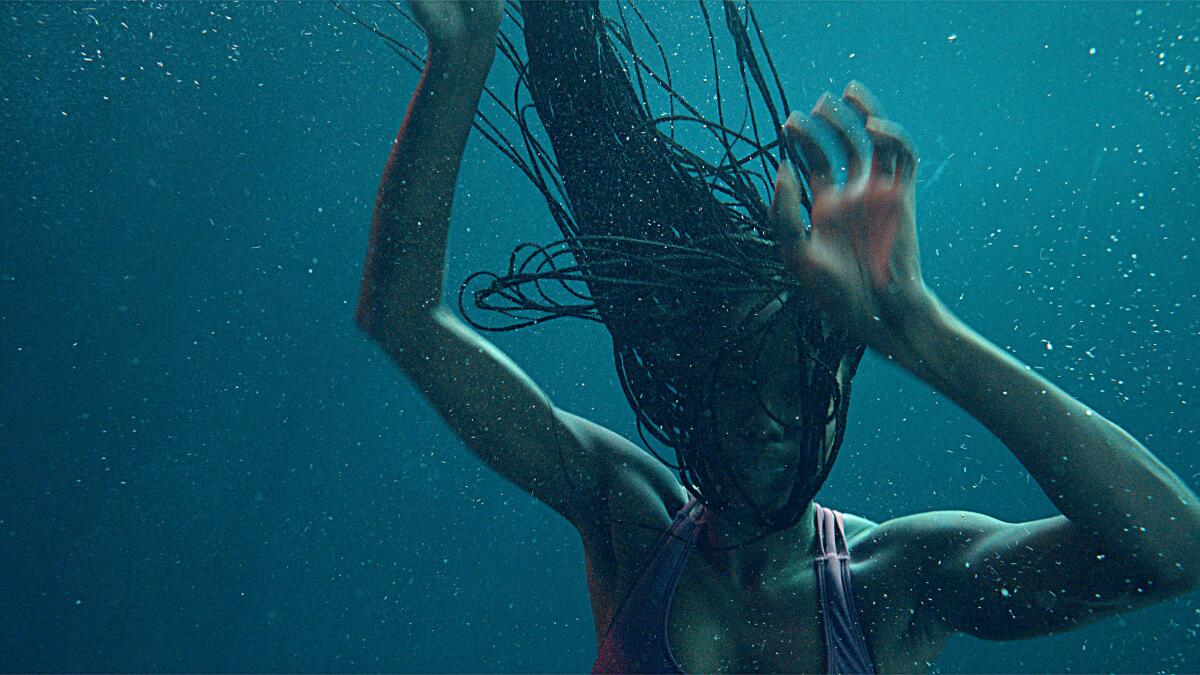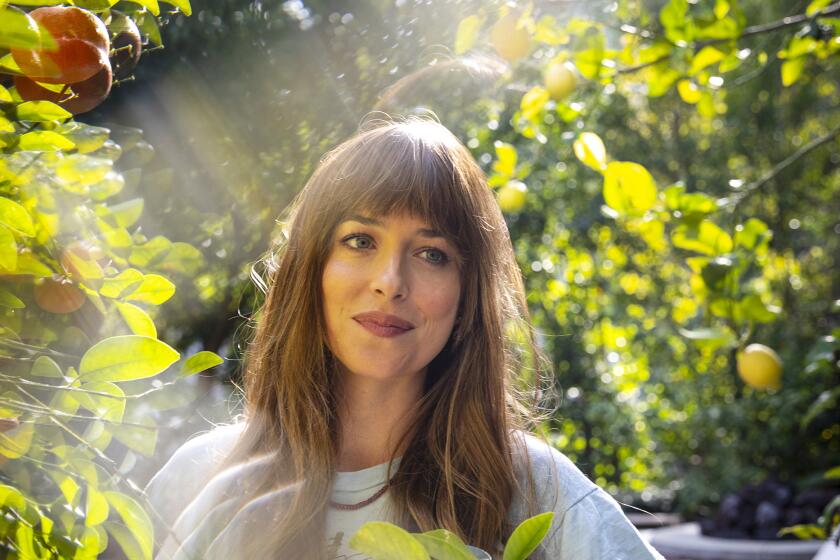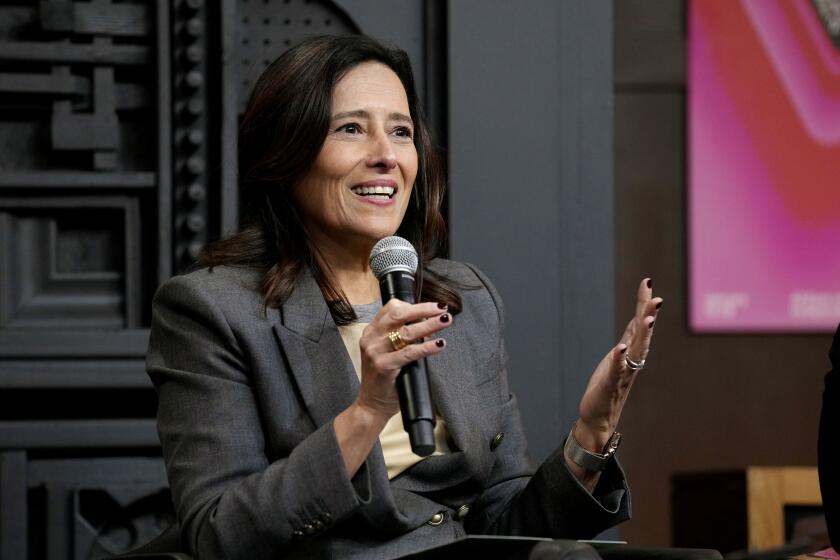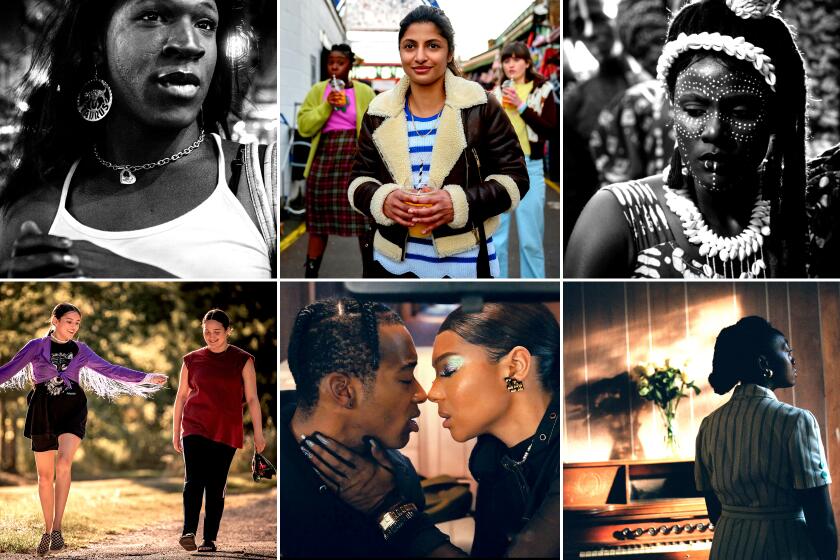How the films of Bong Joon Ho, Guillermo Del Toro and more inspired Nikyatu Jusu’s ‘Nanny’

- Share via
Premiering as part of the U.S. dramatic competition at the 2022 Sundance Film Festival, “Nanny” combines a domestic drama with elements of folklore and horror filmmaking to create an unsettling examination of work, privilege and perseverance.
Written and directed by Nikyatu Jusu, the film follows Senegalese immigrant Aisha (Anna Diop), who takes a job as a nanny for a wealthy New York City couple, Amy and Adam (Michelle Monaghan and Morgan Spector), with hopes of saving enough money to have her son join her in America. As Aisha finds herself caught in the dynamics of Amy and Adam’s distant, unhappy marriage, she begins to feel a supernatural presence invading and tormenting her life.
The film is the feature debut for Jusu, who was previously at the festival in 2019 with her short film “Suicide by Sunlight.” As part of this year’s virtual Times Talks @ Sundance, sponsored by Chase Sapphire, Jusu was joined by Diop, Monaghan and producer Nikkia Moulterie to discuss the film.
Jusu noted how she is influenced by international filmmakers such as Bong Joon Ho, Park Chan-wook, Lynne Ramsey, Andrea Arnold and Guillermo del Toro in her approach to using genre as part of her storytelling.
“The cinema that I have a lot of reverence for tends to be crossing multiple genres. Whereas in America, we’re very much pigeonholed into, ‘Is this horror? Is this drama? Is this a comedy?’” said Jusu. “And I think once you’re given that freedom, you’re allowed to play and really be authentic to yourself as a filmmaker. So straddling those supernatural elements with the straightforward drama was a challenge, I won’t lie, but I felt like I was given permission by the filmmakers who I really admire.”
More coverage of the 2022 Sundance Film Festival.
For Monaghan, playing a character like Amy, who is often seen acting in a self-centered way toward Aisha, oblivious to the other woman’s feelings or what is going on in her life, brought real personal reflection.
“There were facets of Amy that I think that we see a lot in this world. As a white privileged woman, I see it everywhere in my own experience,” said Monaghan. “And I wanted to be able to humanize this woman. And I don’t mean it in the traditional sense that one sympathizes with a woman like this, that kind of perpetuates and benefits from white privilege. I didn’t want to humanize her in that way. I wanted to humanize her in a way that would allow introspection, hopefully from audiences that watch it and perhaps see themselves in it, and have it confront our own biases in how we contribute and perpetuate.
“Sometimes the scarier things are what’s inside us, right?” said Monaghan. “And I think what this film does so beautifully is it balances both of those things. We see these really overt external things that are scary and then we see the internal conflict. And that is oftentimes what permeates society and how we pay that forward and pass that on.”
That tension between internal and external forces at play for Aisha was a strong motivation for Diop as well.

“I remember feeling that Aisha — as the film goes on and as these supernatural elements and everything else start confronting her,” Diop explained, “and trying to approach it from an acting standpoint and from a grounded standpoint — she just is becoming more and more confused. And everything that she had painstakingly pieced together in planning to bring her son to the States just becomes challenged, and it becomes confusion to the point of terror. And I think that’s something we can all kind of relate to as we move in life. When we find ourselves in places where maybe we feel lost about even who we are, who we thought we’ve been all this time, or if the decisions we’ve made are right. And that is a confusion to the point of terror.”
“I think what Michelle said about confronting the monster inside of us is really the backbone of this film,” Jusu added. “The scariest part of horror and monster creation is not the monster itself, it’s the monster that we are ignoring internally.”
The material hit close to home for many involved in the production. Jusu was born in America to parents from Sierra Leone, and while she was growing up her mother was a domestic worker. Diop’s mother was also a domestic worker and she herself worked as a babysitter and a nanny. So the often difficult dynamics between employer and employee in the domestic space were familiar to them both.
“When Aisha does show up in these spaces, in Amy’s world, she has to shut down a lot of who she is in order to be in these spaces and to do the job that they’ve hired her to do,” said Diop, also familiar to audiences from her role on the HBO Max series “Titans.” “And I’ve seen my mom do it, I saw my mom do it for so long.
“So Aisha too, she can’t fully be herself in these spaces and she knows what she’s there for and she knows what they want her there for,” Diop said. “And so she shuts down what she needs to shut down in order to do what she’s there to do, which is survive, make money to get out.”
Dakota Johnson’s TeaTime Pictures will unveil “Am I OK?” and “Cha Cha Real Smooth” at this year’s virtual Sundance Film Festival.
In creating the film’s depiction of a sleek, upscale world, the production relied on her creative team that included cinematographer Rina Yang, production designer Jonathan Guggenheim and costume designer Charlese Antoinette.
As Moulterie explained, “I think even pre-pandemic, we really wanted to figure out how to shoot it in New York. And we had a brief period of trying to maybe switch gears given what was going on in the world. But it was really important to find authentic spaces, and we might have made a few compromises, but the apartment needed to look and feel like an affluent space in New York City. So we leaned into Tribeca and we made it work.
“It was quite the production schedule puzzle,” she added, “but I think when you get a script like Nikyatu’s, you just want to do it justice. And the locations are so integral to building the world. So we really kept it authentic. It was just really important to the story and to the world that we were creating.”
The story explicitly references figures from African folklore such as Anansi the spider and the mermaid-like Mama Watu. Jusu explained why she likes adding genre elements to a story that could have easily been told as a straightforward drama.
“I wouldn’t even think about it as adding,” Jusu said. “I would say that it’s a really manipulative way to get people to care about things that they don’t care about. And it’s not pedantic, people are quick to say, ‘I felt like I was preached at.’ But with genre you can use creatures, and fantasy, and folklore to hold people’s hands to thinking about more important things.
“So I’m essentially distracting people from feeling like they’re being preached at through genre,” said said. “Also, additionally, I think there’s a lot of Black and African diasporic folklore that hasn’t been tapped into in the American cinematic paradigm that I would like to introduce to the American audience.”
Chase Sapphire has no influence over editorial decisions or content.
More to Read
Only good movies
Get the Indie Focus newsletter, Mark Olsen's weekly guide to the world of cinema.
You may occasionally receive promotional content from the Los Angeles Times.













